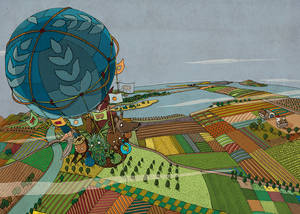by BAHER KAMAL
 Through a new global video and poster contest, FAO is asked the world’s children to help it highlight how climate change is making the task of feeding a growing world population all the more challenging – and what we can all do, together, to meet that challenge IMAGE/FAO
Through a new global video and poster contest, FAO is asked the world’s children to help it highlight how climate change is making the task of feeding a growing world population all the more challenging – and what we can all do, together, to meet that challenge IMAGE/FAO
Can African farmers feed the world?. Apparently the answer is “yes.” Bold as it may sound, this statement is based on specific facts: Africa is home to 60-65 per cent of the world’s uncultivated arable land and 10 per cent of renewable freshwater resources, and it has registered a 160 per cent increase in agricultural output over the past 30 years.
This data was provided in July this year by the NEPAD (New Partnership for Africa’s Development), which is the technical body of the African Union (AU), and it reminds that the global population continues to soar, to approach around 10 billion by 2050.
“We’ll need to boost agricultural production by at least 70 per cent,” the Rome-based United Nations Food and Agriculture Organisation (FAO) consequently alerted.
NEPAD goes further and states that, given Africa’s share of the global population is forecast to rise from 15 per cent to 25 per cent, there’s a mounting appreciation that farmers on the second-largest continent –after Asia– will have to play a key role if this boom is to be managed successfully.
“We can and would be happy to feed the world,” said Raajeev Bopiah, general manager of the East Usambara Tea company, which produces over 4 million kilograms of tea a year on its 5,000 acres of land in Tanzania, NEPAD tells. “We just need the knowledge and the funding.”
Roadblocks
There are a number of hurdles to boosting the fortunes of Africa’s farmers, says the NEPAD Planning and Coordinating Agency (NEPAD Agency), which is the AU implementing body that facilitates and coordinates the development of the continent-wide programmes and projects, mobilises resources and engages world’s institutions, regional economic communities and member states.
“One of the biggest obstacles is the messy system of tariffs and inflexible border policies that govern relations between many of the continent’s 55 states. Only 13 countries offer visa-free or visa-on-arrival entry to all Africans, according to this year’s Africa Visa Openness Report.
Businesses in landlocked nations in particular complain that shifting their produce across frontiers to ports is such a fraught exercise that they often incur huge losses in the process, the technical bit of the African Union reminds.
Inter Press Service for more